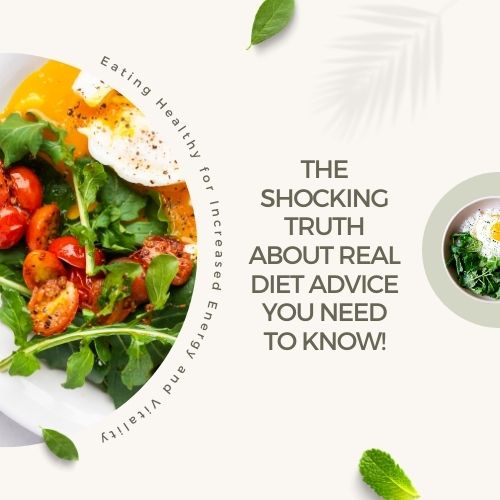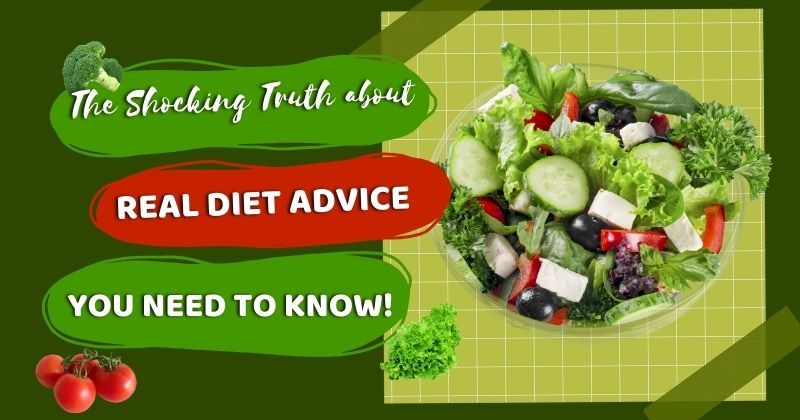Uncover startling truth about real diet advice that could dramatically alter your dieting approach.
Understanding and implementing diet advice can be a daunting task with the deluge of information available on the internet. It’s important to approach it sensibly, unraveling the truth about real diet advice from the multitude of myths.
Many sources often simplify the process of nutrition and dieting to catchy phrases or fad diets, which may not align with the scientifically backed principles of healthy eating. Hence, it’s crucial to be well-informed and skeptical, embracing strategies that are sustainable and tailored to your individual needs, instead of quick fixes. As we dive into this exploration of dieting truths, we’ll decode the science behind nutrition, dispelling misconceptions while unearthing actionable insights. Expect to navigate through a comprehensive journey of understanding your body, its nutritional needs, and how you can truly nourish it for optimal health and well-being. This journey will offer a unique perspective, shattering popular beliefs and revealing the shocking truth about real diet advice you absolutely need to know.
The Truth about Real Diet Advice You Need to Know
While there’s no one-size-fits-all approach to diet and nutrition, certain principles are universal. Real diet advice goes beyond cutting out food groups or obsessing over calorie counts. It incorporates wholesome eating habits, lifestyle changes, and an understanding of how food affects your body.
This holistic approach also highlights the importance of diversity in your meals, integrating various food groups to ensure a balanced intake of essential nutrients. It’s critical to understand that moderation, not deprivation, is the key to maintaining a healthy relationship with food. This means you can enjoy your favorite treats occasionally without guilt, provided your diet predominantly consists of nutrient-dense, unprocessed foods. Real diet advice encourages mindful eating, teaching you to listen and respond to your body’s hunger and fullness cues instead of following strict eating schedules. It’s a journey of self-discovery and compassion, where you learn to treat your body with respect by fueling it with the right nutrients, at the right time, in the right quantities.

A Balanced Diet is Key
A balanced diet comprises a variety of different foods eaten in moderation. The body needs more than 40 nutrients and no single food can supply them all. The Food Pyramid serves as a good guide for balanced meals.
- Carbohydrates: Comprising 45-65% of your daily calorie intake, they are the body’s primary source of energy. They’re found in fruits, vegetables, and whole grains.
- Protein: Proteins should be about 10-35% of your daily calorie intake. They’re found in meats, dairy products, and legumes.
- Fats: 20-35% of your daily calorie intake should come from fats. They’re found in oils, nuts, dairy, and meat.
The Truth about Calorie Counting
While keeping track of your calorie intake can help, it’s essential to understand that all calories aren’t equal. 200 calories from a doughnut are not the same as 200 calories from avocado. Real diet advice prioritizes the quality of your calorie intake over the quantity.
Calorie counting doesn’t consider the nutritional value of food, and a diet high in empty calories but low in nutrients can leave you feeling unsatisfied, leading to overeating. For instance, nutrient-dense foods like fruits, vegetables, and lean proteins not only provide you with essential nutrients but also keep you satiated for longer, curbing unnecessary cravings. Conversely, consuming empty calories from highly processed foods may lead to nutrient deficiencies and an increase in unhealthy weight gain. In the broader context of a healthy diet, it’s not just about how many calories you consume, but where those calories come from. Therefore, the focus should be on nourishing your body with quality food rather than just restricting calories.
Real Diet Advice and Fad Diets
Fad diets often promise rapid weight loss or other health advantages, such as reversing heart disease or diabetes. However, these diets are often not based on sound scientific evidence and may actually be harmful. They usually restrict certain food groups, which can lead to nutrient deficiencies.
Here’s a comparison table of fad diets and balanced diet advice:
| Fad Diets | Balanced Diet Advice | |
| Quick Results | Yes | No |
| Long-term Sustainability | No | Yes |
| Nutrient Deficiencies | Likely | Unlikely |
| Based on Scientific Evidence | No | Yes |
| May Cause Health Risks | Yes | No |
The Real Diet Advice on Exercise
Exercise complements dietary changes. It helps to regulate weight, improve body composition, and boost overall health. You can’t compensate for unhealthy eating habits with exercise, and likewise, eating well won’t replace the need for physical activity.
Regular exercise aids in digestion, metabolism, and helps your body effectively utilize the nutrients you consume. It’s about more than just burning calories; it plays an essential role in maintaining bone health, enhancing muscle strength, and improving mental health through the release of endorphins, the body’s natural mood boosters. Moreover, exercise can help regulate blood sugar and improve heart health, reducing the risk of chronic diseases. However, it’s important to find a form of physical activity that you enjoy and can sustain in the long term, whether it’s walking, swimming, weight lifting, yoga, or dancing. As a part of real diet advice, maintaining a balance between proper nutrition and consistent exercise is the key to a healthy lifestyle.
FAQs
- Is it okay to occasionally indulge in my favorite unhealthy food?
Yes, moderation is key. Depriving yourself completely often leads to binge-eating.
- Are all fats bad for my health?
No, your body needs fats for energy and critical functions, such as nutrient absorption. Unsaturated fats, found in foods like avocados, nuts, and oily fish, are beneficial.
- How often should I exercise?
The CDC recommends at least 150 minutes of moderate-intensity aerobic activity every week for adults.
- Do I need to cut out carbohydrates to lose weight?
No, carbohydrates are an essential part of a healthy diet. Opt for complex carbs like whole grains, fruits, and vegetables over refined ones.
- Are vegetarian or vegan diets healthier?
Not necessarily. While they can be healthy, it’s important to ensure that they provide all necessary nutrients.
Key Takeaways
- Balanced diet is key to maintaining a healthy lifestyle.
- Not all calories are equal; focus on nutrient-dense foods.
- Fad diets can lead to quick results but are not sustainable or healthy in the long run.
- Regular exercise is as important as healthy eating.
- A good diet adapts to your lifestyle and needs, not the other way around.
Recommended Post for You
- Real Diet Advice: Transformative Tips Beyond the Hype
- The Real Deal: Unveiling the Benefits of Real Diet Advice
- Real Diet Advice: Your Key to a Healthier Lifestyle
- Top 3 Misconceptions About Real Diet Advice – Debunked!
- Debunking Myths: The Real Facts About Real Diet Advice
- Is Real Diet Advice a Game-Changer? Truth Revealed!
- Boost Your Health with These 7 Real Diet Advice Tips
- Master Your Meals: Real Diet Advice for Meal Planning
- Why ‘Real Diet Advice’ Isn’t As Scary As You Think!
- Stop Guessing: Get the Real Diet Advice You Deserve
References
Remember, real diet advice is about long-term sustainable habits and not quick fixes. You owe it to yourself to understand the truth about real diet advice and incorporate it into your lifestyle. You will not only look better but feel better too!
